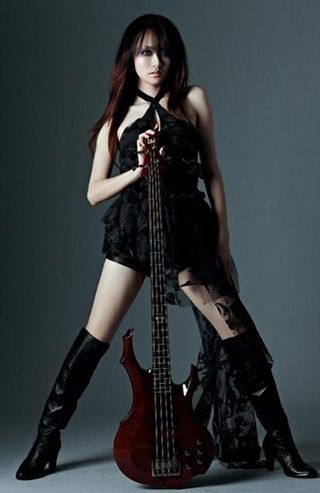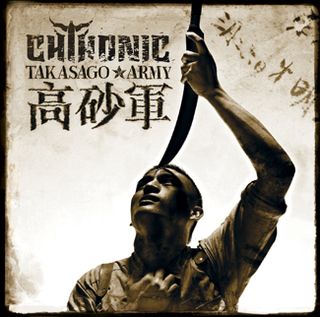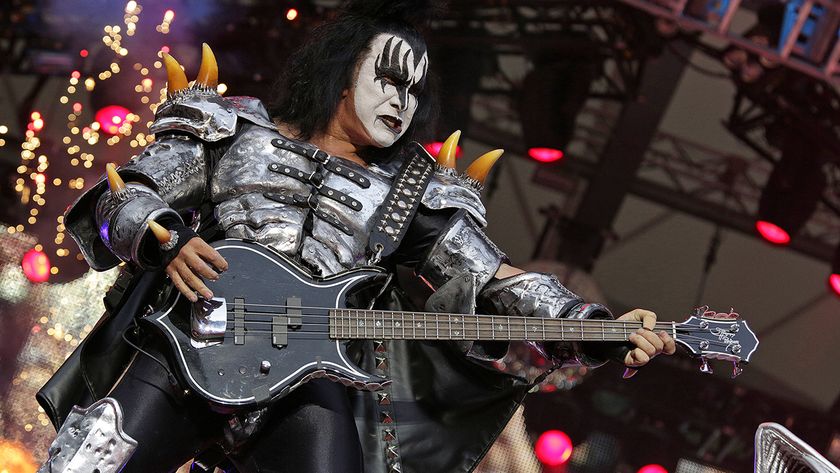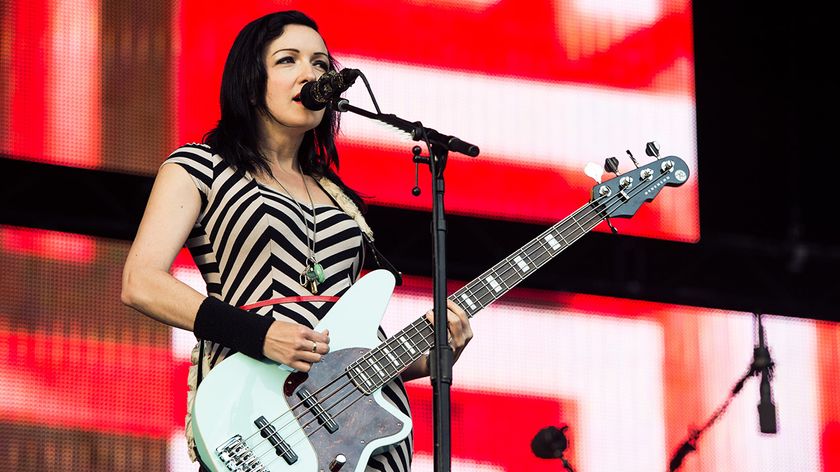Interview: Chthonic Bassist Doris Yeh Discusses New Album and Scary Touring Experiences

Taiwanese extreme metal outfit Chthonic has truly been one of the most unique bands around since their inception more than 15 years ago.
They combine elements of black metal and traditional Taiwanese music to convey the story of their ancient history and culture. It is this hugely artistic and exotic touch that separates them from the often bland and generic world of extreme metal.
In addition to being immensely talented musicians, the band members are also political activists, not afraid to voice their sentiments through the lyrical concepts, and for this reason they have created controversy in certain East Asian countries but on the other hand also won awards in their home country.
As the years have gone by, they have garnered an international fan base including a more than decent following in the US which enabled them to appear on the 2007 Ozzfest bill, among various other tours.
Now they are preparing to release their sixth studio album, Takasago Army, and with this album they are set to undergo a musical progression and a refreshing change in image, which will certainly make them even more unique than they already are.
I got a chance to have a detailed conversation with bassist Doris Yeh, and besides talking at length about the lyrical and musical concept behind the new album, she was really candid with her recollection of a past US tour, because of which the band is "scared" to come back here.
Read the conversation below, and check out the band's Facebook page for more news and updates.
Get The Pick Newsletter
All the latest guitar news, interviews, lessons, reviews, deals and more, direct to your inbox!
Your new album, Takasago Army, came out in North America on September 6. Tell us about it.
The title of the album, Takasago Army is the name of a army from Taiwan that fought for the imperial Japanese army in the Pacific war over World War II. So from the title you can see that our background is set to happen in World War II, and we created new characters who were living in that generation and went through very difficult times from the Japanese colony.

After World War II, the Chinese army came to Taiwan and occupied Taiwan, and we [Taiwanese] went through other difficulties against the Chinese army. So it's kind of the process for not only Taiwanese but for a human to find his own identity. This is the background of the story, and as for the music part, we kind of transformed the way we were composing the songs.
Before, we were trying to write good metal songs and put traditional instruments into the songs, but in this album we tried to write traditional Taiwanese folk music and make it as heavy as it can be. We used an extreme metal way to express the emotion, the story and the music of our own Taiwanese folk.
What traditional instruments did you use? Have you used these instruments before, or was it something new this time?
There is an instrument called Hena, which is a 2-string violin. We've used that instrument for over 10 years. The Hena appeared in every album of ours. We have already released six albums so far, and that is the oldest traditional instrument we used all the time. But from this album, because the background is Taiwan during World War II, and Taiwan has been occupied by different Eastern Asian countries, to describe the story we not only used Taiwanese traditional instruments but also Japanese instruments like Koto.
We also used Taiwanese aboriginal flute, because the main character we created in this album is aboriginal and he is from the mountains, so they have their own culture and their own traditional instruments. So we used that, and also we added Tibetian bells into the music as well. So in this album, we used much more Oriental instruments than before.
This album is said to be completing the story of the previous two albums. In what way is it connected with those albums?
Actually, when we started to write this album, we never ever saw that it can be a trilogy because we just write about a topic that we are interested in. The timeline of this album is during and after World War II, and in our previous album, Mirror Of Retribution, the background is after World War II. Like I said, in this album we are talking about the Taiwanese aboriginal soldiers who've been through Japanese colonial period and then through the period of Chinese army occupying Taiwan.
But Mirror Of Retribution is talking about what happened after the Chinese army came into Taiwan. From a temple, he [the solider] went to hell, killed the tyrant of the Chinese army and tried to chant this sad, tragic destiny of the Taiwanese. We've always been occupied by other countries. We've been forced to be involved in different wars, and we didn't want to do that even though we had to fight against the army that occupied Taiwan. So this is what Takasago Army and Mirror Of Retribution are talking about. And for our fourth album Seediq Bale, the timeline is before World War II. At that time Japan was starting to come into Taiwan and there were some aboriginals who fought against the Japanese army. But after their heroic battle, they still failed and remained in their tribe. So that's the connection between the three albums.

The main character of Takasago Army is the offspring of the Seediq tribe. That means his father and grandpa has been fighting against the Japanese Army. But after the brainwash education for ten years, he has been faithful to the Japanese empire, so he fought for the Pacific War. It's quite interesting that when we were writing the story for this album, we found out that everything seems connected.
You talked about the use of traditional instruments and changing the approach for composing songs. So overall, how does the album musically compare to the previous ones?
In this album there is more oriental melody, and different composing of the songs compared to the previous albums. I think the fans can find that we put many oriental, exotic tastes in this album than the former two albums. There are two important parts of our music, one is the music part and the other is the concept part. For the music part, you can find that the melody is more oriental, and in the concept part you can find that this time we are not talking about big issues like heroic battle or deciding between two countries.
In this album, even though it happens during World War II, we are talking about the different emotions inside the soldiers who fought for World War II. So he is missing his family, his wife and his children. When will he come back home? Will he see his family alive? What is he, a Taiwanese aboriginal, Japanese or Chinese? It's the confusion of the identity and the process to find the identity of himself. So the concept is also quite different.
This time you are also going to change the costumes for the shows, and you're not going to wear the corpse paint. So it must be a good feeling to be able to change it up.
The biggest difference in our make-up now is that we removed the white part, because sometimes we were misleading the fans and the critics to think that we are a typical black metal band. Even though we used black and white color in our faces to show the traditional symbols of our Taiwanese culture, only a few people know the story behind it so we finally we thought that the white color makes the whole make-up process more complicated (laughs), so we can just remove it and make our symbols very clear so that people can easily figure out the differences between us and other extreme metal bands. We are more oriental and we are talking about history and a story that other bands never talked about.
You have a tour coming up in North America with Arch Enemy, DevilDriver and Skeletonwitch. You must excited to come back here after a long time.
Yeah, last time we toured America was 2009 with Satyricon and Bleeding Through. Like everyone says, the US market is difficult. I don't why, but to find a good driver, a good van company and a good shower in the backstage, and the simple things like that is difficult sometimes (laughs). May be it's the cultural difference. Sometimes there are small things, but also there occur some big problems on the road. So we have been very careful in choosing the right chance to tour America after that tour in 2009. We toured with Arch Enemy last year in the UK and we had a very good discussion [with them].
We are just about releasing our new album at the same time, so they invite us to join their tour in America and we thought that it's a big tour and a very good line-up to tour with, Arch Enemy, DevilDriver and Skeletonwitch. So we thought, OK, maybe it's time to come back to the US, even though we have to conquer our fears of shower and transportation (laughs).
Hopefully it will be better this time and I'm sure you'll find showers at every show!
Yeah, and I hope the environment in the backstage won't be too horrible (laughs).
Right, and you said that you toured with Arch Enemy last year. How did their crowd respond to your music? Did you make some new fans?
Yeah, it was a pretty good chance to tour with them. Arch Enemy is really big in Europe. They are incredible on the stage, very powerful and they provoke the emotions from the fans. They are very professional and their songs, of course, are amazing. We love their music very much, and I think they have the same feeling about songwriting. We played with Arch Enemy on the same stage for the first time in 2002, in Milwaukee at the Metal Meltdown Festival. At that time, we were just a new band, of course, and that was the first time we played in a Western country. So we were very nervous.
But last year in 2010 on the tour with Arch Enemy, after those years of experience we kind of grew up very much. They came out to see our shows and saw the difference. I think they loved our performance and songs very much, and their bassist even came to the backstage area of our band to talk with me. He said he still remembered what I looked like in 2002 on the stage (laughs). He said that I was very calm and didn't move even though our music was still good. But this time when I played on stage it was totally different, full of energy and power.
So he was kind of shocked and he liked it a lot. So as for the fans, I think the UK fans like us because we just finished the Download Festival in June. The UK fans showed their enthusiasm to our music very well, so I think we got a very good experience by touring with Arch Enemy and we got a very good reaction from UK fans which we've been working very hard to achieve for a few years.
Before that, you toured with Satyricon in the US. What problems did you face on that tour?
(Laughs) It was a weird situation and I actually still don't know what happened because the headliner was Satyricon and Bleeding Through was supposed to be the co-headliner, but in the end I don't know why there was only one headliner and Bleeding Through was the support band. We shared the same bus with Bleeding Through. They were pissed off about something in the middle of the tour. It was nothing about Chthonic, it was something about the whole tour. And they quit their tour in the middle.
When the tour arrived in LA, because LA is their hometown they jumped off from the bus (laughs). And, of course, when they left the bus, we couldn't afford the whole cost of the tour bus. So we were forced to leave the bus and rent a new van. Everything was starting from the beginning again and I really can't believe that these things happened because nobody said anything even one day ago. We didn't have time to prepare for that. I'm not blaming them because as I said, I think it's the culture difference or the way most American bands do, I'm not sure (laughs). But we are so afraid of this kind of things happening.
In the middle of the tour, something happened with our driver because he didn't get money from our manager and Bleeding Through's management. I can't remember the details, but it was something that our ex-manager did and he couldn't explain it to us. We fired him (laughs), rented a new van, started the tour again, and finished the tour with Satyricon in the end. This kind of process really pissed me off, because the bands we toured with, our manager, and everybody knew something about the financial problems and were hiding from us. They were not really honest to us.
A lot of shit happened on that tour, so actually the shower is not the most horrible thing of that tour, and I think people were the most horrible (laughs). So we are kind of very scared about that. But I'm sure in this tour it will be better. I hope so.
After this tour, what are you planning in terms of more touring? Will you be coming back for more tours in the US or you don't know yet?
We don't know yet. Actually we are scared (laughs). This time we are touring with Arch Enemy so we are coming back. We knew that we had good sales of our last album over the US and Canada. Actually we don't have big problems playing in Canada. The situation there is more stable and more under control. But if you tour Canada, sometimes you have to tour the US also. One of the other important reasons is we very much want to come back to see our fans. On the last tour, even though we opened for Satyricon and Bleeding Through, we still had our own headline shows and we loved our fans in the US very much.
But it's just the environment that forced us to be afraid to come back again. But if there is any good chance of another tour happening in the US, we definitely will come back. So we hope that in the future, if this tour goes very well, we will come back much more often.
Andrew is a Los Angeles-based writer who has been running his own website, Metal Assault, since early 2010, and has been prolific in covering the hard rock and heavy metal scene by posting interviews, reviews and pictures on his website -- with the help of a small group of people. Besides being hugely passionate about heavy metal, he is an avid follower of jazz music and recently started a blog called Jazz Explorer to pursue that interest.

“You can set up amplifiers and drums to your heart’s content”: Gene Simmons defends paid roadie scheme

“I woke up to a DM from Shirley Manson asking if I'd be interested in the gig. We had never met”: Former Smashing Pumpkins bassist Nicole Fiorentino on how she landed her role in Garbage – with no audition










